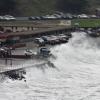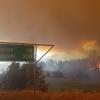Here we are in the Lower Mainland of BC, on the river that has been referred to as “the world’s greatest salmon river,” a.k.a. the Fraser – or to use one of its more venerable names, the Stó:lō.
Environmental Law Alert Blog
Through our Environmental Law Alert blog, West Coast keeps you up to date on the latest developments and issues in environmental law. This includes:
- proposed changes to the law that will weaken, or strengthen, environmental protection;
- stories and situations where existing environmental laws are failing to protect the environment; and
- emerging legal strategies that could be used to protect our environment.
If you have an environmental story that we should hear about, please e-mail Andrew Gage. We welcome your comments on any of the posts to this blog – but please keep in mind our policies on comments.
This post is Part 2 in a series about NAFTA and its implications on the environment. Read Part 1 here.
When it comes to climate change, there is no free lunch. But sometimes people are stuck arguing over the bill.
Road sign along the route of the Tar Sands Healing Walk, Treaty 6 Territory, Alberta, 2014. (Photo: Eugene Kung)
We congratulate the cities of San Francisco and Oakland for insisting that their taxpayers shouldn’t pick up the full tab for the escalating costs of climate change.
On October 2, 2017 – in just over two weeks – the Federal Court of Appeal (FCA) is scheduled to start the longest hearing in its history, for the consolidated challenges to the National Energy Board (NEB) and Federal Cabinet approval of Kinder Morgan’s Trans Mountain Project.
The summer of 2017 has been dramatic in terms of showcasing the impacts of climate change.
Last month Michael Sawyer (with funding from our Environmental Dispute Resolution Fund (EDRF) won a major victory against liquefied natural gas (LNG) development – and for environmental oversight of oil and gas pipelines.
Is this the beginning of something new? Are governments finally challenging the so-called “right” of fossil fuel companies to make unlimited profits from products that cause climate change while expecting taxpayers to pay for the impacts of those products?
[Update 24 July 2017 - As of yesterday (23rd of July) the BC Wildfire Statistics page reports that 372,719 hectares have been burnt so far this year. That means that in terms of area burnt this year is now worse than the massive










